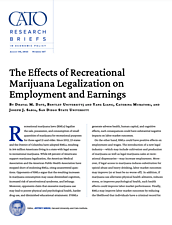On the other hand, RMLs could have positive effects on employment and wages. The introduction of a new legal industry—which may include cultivation and production of marijuana as well as legal marijuana sales at recreational dispensaries—may increase employment. Moreover, if legal access to marijuana induces substitution for opioid abuse and heavy drinking, labor market outcomes may improve (or at least be no worse off). In addition, if marijuana use alleviates physical health ailments, reduces stress, or improves psychological health, such health effects could improve labor market performance. Finally, RMLs may improve labor market outcomes by reducing the likelihood that individuals have a criminal record for marijuana possession. This may be especially true for young black and Hispanic men, who have disproportionately suffered diminished labor market opportunities due to more often having a criminal record.
Our study is the first to comprehensively explore the impact of recreational marijuana legalization on labor market outcomes of working‐age individuals (aged 16–64). First, using data from the 2002–2020 National Survey on Drug Use and Health, we documented that RML adoption is associated with a 2–4 percentage point increase in adult marijuana use. We also found that the largest increase in marijuana consumption occurs a year after RML adoption.
Next, using monthly data from the Current Population Survey outgoing rotation groups, we found little evidence that RML adoption has an impact on the probability of employment or on wages of all working‐age individuals. We also examined the effects of RMLs where recreational sales were allowed (i.e., at dispensaries) and for various working‐age populations by age, gender, race/ethnicity, and education and found little evidence of adverse labor market effects.
Instead, our findings show that RML adoption is associated with small increases in adult employment in the agricultural sector, consistent with the opening of a new legal market to cultivate marijuana. Among the first states to adopt RMLs, California, Colorado, and (to a lesser extent) Oregon saw boosts in agriculture work. There is also some evidence that RML adoption is associated with modest (often short‐run) employment gains for Hispanics and people older than 30. We conclude that legalization of recreational marijuana has few adverse labor market effects for most working‐age individuals and may generate small benefits for some.
Note
This research brief is based on Dhaval M. Dave, Yang Liang, Caterina Muratori, and Joseph J. Sabia, “The Effects of Recreational Marijuana Legalization on Employment and Earnings,” National Bureau of Economic Research Working Paper no. 30813, December 2022.

